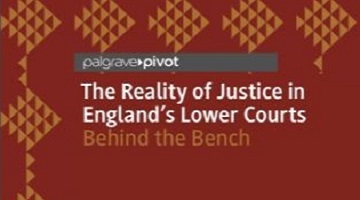Why study Law at Liverpool John Moores University?
- 95% of students surveyed said the teaching staff were good at explaining things (National Student Survey 2024)
- Attend solicitor / client interviews from your first year onwards
- Opportunities in your final year to work on the Support Through Court scheme at Liverpool Civil & Family Justice Centre*
- Highly active student Law Society
- Direct progression onto professional practice training programmes
- Teaching from supportive and highly qualified legal professionals and academics
- Sandwich year option providing students with the opportunity to undertake a supported, year-long work placement in the UK or overseas
- Read our student blog about the latest field trip to a former prison in Lancaster
About your course
The professionally accredited LLB (Hons) Law is uniquely placed by giving students the opportunity to observe law in action from Semester 2 of their very first year, through our award-winning Legal Advice Centre.
This course is truly innovative in that you can observe real law in action from Semester 2 of your first year. The core module in your first year (level 4) 'Law in Society' is delivered by our award-winning Legal Advice Centre and means you will gain invaluable insight into the pro-bono work that we are proud to undertake, attending solicitor interviews with clients and helping to support access to justice in our city.
The Legal Advice Centre is something you can be part of all the way through to your final year of study. Since 2014, LJMU's Legal Advice Centre has helped over 500 clients and given £0.6million worth of free advice to the local community.
*There are 24 places available for students who select the level 6 Year Long Advanced Clinical Legal Education module to spend the year working with Support Through Court at Liverpool Civil & Family Justice Centre. You work one full day a week on site helping the service.
Every year, thousands of people in England and Wales face court alone. Often through no choice of their own, they must represent themselves at a moment that could determine the rest of their life. They may face eviction from their home or lose contact with their children. In an unfamiliar courtroom, up against a party with legal representation, the process can be stressful and confusing. Support Through Court Liverpool stands with those who have nowhere else to turn, offering support and guidance before, during, and after court. They make sure people facing court are not alone and help them navigate a complex legal system with dignity and self-assurance, so that they can best represent themselves.
Student support and availability directly contributed to Support Through Court Liverpool returning to full time operating hours which had previously been reduced due to the impacts of the pandemic. In the academic year 2022-23 LJMU students assisted clients on 1376 occasions and supported 178 hearings (a 147% hearing increase from the preceding 6-month period when students were not on-site in Liverpool), as well as developing essential legal and employability skills.
Support Through Court Liverpool is a five-year exclusive partnership with LJMU and is only available to LJMU LLB Law students.
Law Competitions
Our style of teaching has an enviable record in regional and national mooting competitions. Mootings are mock court room trials, where students argue their cases before Senior Barristers.
Final and second year students Emily and Shay won the prestigious Oriel Chamber competition this February.
We also have a history of success at the Client Interviewing and Counselling Competition, and we hosted the UK's first ever National Mediation Competition for law students.
More recently, a Mediation team represented the School at the prestigious INADR Inaugural Invitations Law Schools Mediation Tournament in Dubai - the team were crowned overall champions and each individual received a top 10 finalist spot.
LJMU is one of very few law schools currently offering a sandwich year option LLB, which combined with a range of unique features, such as our student mentoring scheme, and our active student law society, will provide you with excellent ways to develop future employment opportunities.
Course modules
What you will study on this degree
Further guidance on modules
Modules are designated core or optional in accordance with professional body requirements, as applicable, and LJMU’s Academic Framework Regulations. Whilst you are required to study core modules, optional modules provide you with an element of choice. Their availability may vary and will be subject to meeting minimum student numbers.
Where changes to modules are necessary these will be communicated as appropriate.
Core modules
Criminal Law
20 credits
20 credits
This module introduces you to the underpinning principles to criminal liability and legal defences. You will learn to explain, illustrate and demonstrate legal knowledge of the main offences and defences in a succinct, coherent and logical structure, alongside the ability to appraise a particular area of debate in criminal law and evaluate the benefits or drawbacks of the current state of law.
Contract Law
20 credits
20 credits
This module provides a basis for knowledge, understanding, analysis and application of the principles of contract law. You will be able to recognise the basic concepts, values and principles of contract law, alongside the ability to evaluate and apply knowledge and understanding of contract law to complex legal problems.
Foundations and Independent Learning
20 credits
20 credits
The module introduces students to the basic concepts, structures and mechanisms through which English Law develops. Students will gain and understanding of the importance of judicial law-making and the significance of international law and the issues surrounding law and morality and law and justice.
Constitutional Law
20 credits
20 credits
Within this module you will gain an appreciation of both the constitutional arrangements of the UK and the theoretical framework underpinning them. This module also facilitates a contextual and critical appreciation of the relationship between law and politics relating to the administration and governance of the British state.
Law of Tort
20 credits
20 credits
This module will allow you to understand the basic concepts, values, principles and rules of tort. You will evaluate principles of the law of tort and should be able to apply legal knowledge to complex problem and present informed conclusions. After completing this modules you should be able to present an argument in a way that is comprehensible to others and which addresses their particular concerns or questions.
Legal and Professional Ethics
20 credits
20 credits
This module introduces the basic elements of professional conduct and clinical legal education. You will observe live client work in the Legal Advice Centre.
Core modules
Equity and Trusts
20 credits
20 credits
This module enables you to develop a firm understanding of both Equity and Trusts. You will learn to apply legal knowledge to problem questions, drawing logical conclusions which are substantiated by legal authority. You will also learn to demonstrate a critical awareness of the historical, socio legal and political context of equity and trusts.
Justice, Human Rights and the State
20 credits
20 credits
In this module you will explore the principle methods of controlling executive action in the British State, administrative law and human rights. This module builds on Public Law at Level 4 and serves as a gateway into a number of related public law modules.
Land Law
20 credits
20 credits
In this module you will consider estates and interests in land and other contemporary issues in land. It enables you to demonstrate a firm understanding of Land Law and allows you to apply the core principles of Land Law to a range of problems, essays, and multiple choice questions.
Law of the Single Market of the EU
20 credits
20 credits
After completing the module you student should be able to discuss the roles of the EU Institutions in making and developing law; critique the constitutional the structure of the EU edifice; review the significance and application of EU legal principles; Consider the application of EU legal principles and the scope of application of the freedoms of the single market.
Optional Modules
International Trade Law
20 credits
20 credits
This module introduces you to the basic principles of international trade drawing on an understanding of the motivations for nations to engage in international trade and a review of the general principles which underpin the legal regulation of international trade. Key to this is an overview and understanding of the working of the GATT and the WTO and their role in the regulation of international trade. Furthermore, the module introduces the mechanisms for financing international trade and resolving international trade disputes.
Study Year Abroad - Law
120 credits
120 credits
The aim is to provide students with an additional year of study at an approved overseas partner that will complement their programme at LJMU. This is an additional year of full-time study at an approved higher education institution. The modules to be studied must be agreed in advance, and must be appropriate for the student's programme of study. Assuming successful completion of this year, mark-bearing credit will be awarded by the Faculty Recognition Group. The grade conversion scale to be used will be made available in advance of the year abroad.
Sandwich Year - Law
120 credits
120 credits
The aim is to provide students with an extended period of work experience at an approved partner that will complement their programme of study at LJMU. This will give students the opportunity to develop professional skills relevant to their programme of study as well as the attitude and behaviours necessary for employment in a diverse and changing environment. This extended placement forms a key part of a sandwich degree. All placements need to be assessed and approved prior to commencement in line with the LJMU Placement Learning Code of Practice. The Code of Practice requires students to conduct themselves in a professional and responsible manner during the placement - failure to do so may lead to the placement being terminated prematurely. Placements are normally for one calendar year on a full-time basis. Split placements of a shorter duration may be permissible. There is an expectation that a minimum of 1200 hours will be spent in the workplace.
Law of the Environment
20 credits
20 credits
This module seeks to develop your critical understanding of the philosophical and practical foundations of the law relating to the environment and the creatures that populate it. You will demonstrate an awareness of the impact upon law of other disciplines including politics, sociology, economics and ethics with relation to the law relating to the environment.
Clinical Legal Education I
20 credits
20 credits
This module enables you to understand the basic elements of professional conduct and clinical legal education. You will demonstrate skills in client interviewing, advocacy, case and matter analysis, legal research, and drafting. You will conduct a client interview in a clinical setting (via our Legal Advice Centre) with appropriate supervision and develop the skills to critically reflect on legal services undertaken in the context of a university law clinic.
Criminal Litigation and Advocacy
10 credits
10 credits
This module provides an opportunity for you to acquire knowledge and skills relevant to advising clients being detained at a police station, to prepare for trial and sentence, and to advocate on behalf of persons at stages in the criminal justice process. The module is intended primarily for students wishing to pursue a professional legal qualification following graduation.
Succession, Wills and Admin
10 credits
10 credits
This module provides you with an understanding of the law relating to wills, intestacy, the administration of estates of deceased persons and the practical and technical application of that law.
International Human Rights
20 credits
20 credits
This module is intended for you if you have an interest in how law affects groups and individual people, sometimes helping them to overcome difficulties, sometimes failing them. It will also help students with a general interest in civil liberties and international law. You will develop the ability to critically assess the nature, scope and limits of international human rights law and their political and social contexts.
Maritime Law
20 credits
20 credits
In this module you will study the legal principles that govern Commercial issues in Maritime law, Public International Law and the Law of the Sea. You will learn about maritime issues such as Cargo Claims and Bills of Lading, International Trade and Shipping, Marine Insurance, Carriage of Passengers Liabilities of the Vessel (Collision, Salvage, Average Adjusting) and Piracy.
Optional Modules
Jurisprudence
20 credits
20 credits
This module provides a critical look at the contemporary debates in jurisprudence. You will look at the historical and contemporary issues in jurisprudence and legal theory and learn to identify and understand the major schools of thought and the differences and debates between them.
Company and Business Organisations Law
20 credits
20 credits
This module enables you to develop a sound understanding of business law and practice, in terms of primary source materials, constitutional documents and other relevant agreements. You will develop the key transferrable skills of identifying and analysing relevant information and applying this to meet client needs and effect transactions in the context of business law and practice including taxation.
Family and Child Law
20 credits
20 credits
This module provides you with the knowledge and critical understanding of the structure, sources and content of the law relating to family and children in England and Wales, the UK and international law and the fundamental legal and ethical doctrines which underpin it.
Commercial Law
20 credits
20 credits
This module provides you with a detailed analysis of the various laws relevant to commercial transactions and enables you to examine the various remedies available to buyers and sellers. In a commercial context, this module provides a comprehensive analysis of common law and statutory rules relevant to the sale and supply of goods and services, transfer of title and ownership and title conflicts in sale transactions. It also covers the ever-increasing importance of ADR.
Mediation Skills and Practice
20 credits
20 credits
This is an advanced legal skills module designed to allow you to gain knowledge and experience of the essential lawyering skills of Mediation and the mediation of disputes. It seeks to increase your awareness of the Mediation process, your own mediation behaviour, and the implicit working assumptions that underlie it.
Civil Dispute Resolution
20 credits
20 credits
This module enables you to understand the principles, procedures and processes involved in Civil Dispute Resolution. The module is intended primarily for students wishing to pursue a professional legal qualification following graduation.
Mooting
20 credits
20 credits
This module provides, in a practical context, experience and practise in mooting and advocacy. You will develop an understanding of advocacy and mooting which enables you to argue a case on appeal to an appellate court.
International Law, Peace and Security
20 credits
20 credits
This module provides you with an understanding of the history, nature and operation of international law and the actors and bodies involved in the development and enforcement of international law. It encourages reasoned, critical analysis and debate of contemporary issues within international law, with particular reference to the role of the United Nations in the maintenance of international peace and security.
Property Law and Practice
20 credits
20 credits
This module enables you to demonstrate a firm understanding of conveyancing transactions in both domestic and commercial transactions. You will examine the sequential series of steps in a property transaction and develop skills of fact analysis, identifying legal issues, client goals, transactional procedures, problem solving, advising, writing and drafting within a property context.
Clinical Legal Education II
20 credits
20 credits
This module facilitates you to develop key legal skills in a clinical setting with appropriate supervision, and enables you to deliver services to the community, engaging in external collaboration where required.
Intellectual Property
20 credits
20 credits
This module enables you to explore the content of the main intellectual property rights, as well as the most topical issues facing intellectual property law. You will be able to describe each of the rights encompassed by the term intellectual property, to consider the main legal elements pertinent to each right, to place your study within the broader setting of economic policy and commercial application, and to consider the impact of new technology on these rights.
Employment Law
20 credits
20 credits
In this module you will explore the rights and obligations that arise from employment relationships. You will examine the influence of social, political and economic issues in employment law.
Evidence
20 credits
20 credits
This module introduces you to the important principles that govern evidence, namely that of relevance, admissibility weight, and exclusion. You will also be introduced to the various categories of evidence, the trial process and basic criminal procedure.
Criminal Litigation and Advocacy
10 credits
10 credits
This module provides you with an opportunity to acquire knowledge and skills relevant to advising clients being detained at a police station, to prepare for trial and sentence, and to advocate on behalf of persons at stages in the criminal justices process.
Succession, Wills and Admin
10 credits
10 credits
This module provides you with an understanding of the law relating to wills, intestacy, the administration of estates of deceased persons and the practical and technical application of that law.
Dissertation
40 credits
40 credits
This Dissertation module allows you to undertake an extended look at a legal subject of interest to you. You will develop the ability to analyse and interpret a complex body of legal knowledge in a coherent manner and to present high order legal research and writing skills.
Clinical Legal Education I
20 credits
20 credits
This module enables you to develop basic elements of professional conduct and clinical legal education, and provides a basis for delivering legal services with appropriate supervision.
Advanced Clinical Legal Education
40 credits
40 credits
This module enables you to develop key legal skills in a clinical setting with appropriate supervision. It also enables you to deliver services to the community. You will develop skills in two or more of the following areas depending on clinical work undertaken: interviewing, persuasive oral communication, case and matter analysis, legal research and drafting.
Negotiation Skills and Practice
20 credits
20 credits
This is an advanced legal skills module designed to allow you to gain knowledge and experience of the essential lawyering skills of negotiation and the mediation of disputes. It seeks to increase your awareness of the negotiation process, your own negotiating behaviour, and the implicit working assumptions that underlie it.
Your Learning Experience
Excellent facilities and learning resources
We adopt an active blended learning approach, meaning you will experience a combination of face-to-face and online learning during your time at LJMU. This enables you to experience a rich and diverse learning experience and engage fully with your studies. Our approach ensures that you can easily access support from your personal tutor, either by meeting them on-campus or via a video call to suit your needs.
You will be taught in a mixture of large and small groups led by our experienced tutors. You will also be expected to study independently with tutor support. You will be encouraged to seek out your tutors for support and feedback, both online through our virtual learning environment, Canvas, or in one-to-one sessions and impromptu meetings.
Work-related Learning
Our selective sandwich year option will allow you to spend an academic year on a work placement in a legal or non-legal role.
Every LLB module we teach focuses not only on knowledge but on the skill sets that employers value: analysis, commercial awareness, good presentation and communication, teamwork and problem solving. While the course will develop your academic knowledge to succeed in any legal profession, the skills your learn will be easily transferable to careers beyond law. Communication, writing and organisational skills are all assets that will help you stand out from the crowd when you eventually enter the open job market. In addition to the work-related learning built into specific modules, you will be encouraged to seek out vacation and work placements to get vital work experience. Our student Law Society and dedicated Careers Team provides excellent opportunities to network with local and national solicitors and barristers who could help you to secure a work placement or pupillage; your tutors will also be on hand to support you in finding opportunities.
Dedicated personal tutor, plus study skills support
As well as support from tutors, including a personal tutor, the active Student Law Society allows you to meet fellow students and practitioners through regular legal professional events and careers focused seminars.
Assessment varies depending on the modules you choose, but will usually include a combination of exams and coursework.
The School of Law prides itself on its assessment methods, which combine traditional exams (seen and unseen) and coursework (essays and reports) with pioneering skills-based assessments, such as mooting, dispute resolution and mediation.
We acknowledge that every student is unique and may perform differently depending on how they are assessed, so we offer a variety of assessment options through tailored modules to suit your specific learning requirements.
Where you will study
What you can expect from your School
The School is based both in Hardman House and in the Redmonds Building, in the heart of the bustling Mount Pleasant Campus and Liverpool's growing Knowledge Quarter. Redmonds building is home to high quality lecture theatres and seminar rooms, a mock court room (moot room), social spaces, a cafe and a roof terrace with far reaching views of the cityscape and welsh hills. It is only a short walk from LJMUs Aldham Robarts Library, which contains all the resources you will require for your studies, and is open seven days a week. Hardman House is home to the Legal Advice Centre, open to members of the public, staff and students.
The Law degree offered by LJMU is absolutely excellent, not only is there a diverse range of optional modules but the staff are incredible. During my time at LJMU I represented the University in several national mooting competitions and all members of staff were extremely accommodating in providing guidance and support. The opportunities within the Law School are second to none. I will be leaving LJMU with an abundance of skills and experience that I don't think I would have obtained anywhere else.
Course tutors
Our staff are committed to the highest standards of teaching and learning
-

-
 Lecturer/Senior Lecturer
Lecturer/Senior Lecturer -

Career paths
As an accredited qualifying degree this LLB (Hons) in Law provides the essential academic training required to become a solicitor or barrister in England and Wales, allowing you to progress directly onto the Legal Practice Course or the Bar Professional Training Course.
In addition to preparing future lawyers, the LLB has a wide-ranging appeal in a broad array of careers, from local and central government, the criminal justice system and the commercial world.
All LLB Law students have the opportunity to volunteer for the School of Law's Legal Advice Centre, which offers a range of pro bono legal services to residents of Merseyside, including family law, employment law, wills and administration legal issues. The service works closely with solicitor mentors from some of Liverpool's best legal firms, giving students plenty of opportunities to put their legal education into practice while making connections with local practitioners.
Student Futures - Careers, Employability and Enterprise Service
A wide range of opportunities and support is available to you, within and beyond your course, to ensure our students experience a transformation in their career trajectory. Every undergraduate curriculum includes Future Focus during Level 4, an e-learning resource and workshop designed to help you to develop your talents, passion and purpose.
Every student has access to Careers Zone 24/7, LJMU's suite of online Apps, resources and jobs board via the LJMU Student Futures website.
Professional accreditation/links
Our degree is recognised by the Bar Standards Board as passing the academic stage of qualification to become a barrister. If you wish to become a solicitor then the degree has been adapted to include virtually all of the content for the Solicitors Qualifying Exam 1 and our collaboration with BARBRI will prepare you for the Solicitors Qualifying Exam 1 when you graduate. The School of Law maintains strong links with the local legal community through the Legal Practice Course and the LLM Legal Practice.
Fees and funding
Tuition Fees:
- Home fee:
- £9,535
- Placement year:
- £1,905
There are many ways to fund study for home and international students
Fees
The fees quoted above cover registration, tuition, supervision, assessment and examinations as well as:
- library membership with access to printed, multimedia and digital resources
- access to programme-appropriate software
- library and student IT support
- free on-campus wifi via eduroam
Additional costs
Although not all of the following are compulsory/relevant, you should keep in mind the costs of:
- accommodation and living expenditure
- books (should you wish to have your own copies)
- printing, photocopying and stationery
- PC/laptop (should you prefer to purchase your own for independent study and online learning activities)
- mobile phone/tablet (to access online services)
- field trips (travel and activity costs)
- placements (travel expenses and living costs)
- student visas (international students only)
- study abroad opportunities (travel costs, accommodation, visas and immunisations)
- academic conferences (travel costs)
- professional-body membership
- graduation (gown hire etc)
Funding
There are many ways to fund study for home and international students. From loans to International Scholarships and subject-specific funding, you'll find all of the information you need on our specialist funding pages.
- International fee:
- £17,750
- Placement year international:
- £3,830
International Scholarships and payment plans
Liverpool John Moores University is committed to supporting international students by providing a range of scholarships and flexible payment plans to help students manage their tuition fees.
Scholarships
LJMU provides a variety of scholarships to support international students. Scholarships are available to self-funded students who have accepted their offer and met all the conditions outlined in their offer letter. Students must also demonstrate that they can cover living costs, travel, and other expenses associated to studying at the university. Postgraduate scholarships include tuition fee reductions and are often offered in partnership with external funding organisations.
All self-funded international students are eligible for an automatic scholarship worth up to £4,000. For more details and to view our full list of scholarships, visit the international scholarship webpages.
Deposit
All students must pay a £5,000 deposit before they can receive their CAS letter.
For more information view our deposit page.
Tuition Fee Payment Plan
After paying their £5,000 deposit, students have the option to pay their fees in full or in three equal instalments minus any internal scholarships and discounts. There are two payment options available for international students. You can either pay your tuition fees in full before enrolment or opt for a payment plan. With the payment plan, you can pay your fees in three instalments after making your £5,000 deposit. The first instalment is due before enrolment.
All payments should be made through Flywire. Full details can be found in the How to Pay Guide.
Early Bird Tuition Fee discount
We are excited to introduce a £500 Early Payment Discount to all self-funded international students. Eligible self-funded students who pay their fees by the required deadlines will get a discount which will be automatically deducted from the 1st year of tuition fees.
To see the required deadlines please visit the webpage
Entry requirements
Please choose your qualifications below to view requirements
Grades/points required from qualifications: BBB - ABB (120 - 128)
Work out how many UCAS points your qualifications are worth using the UCAS Tariff Calculator.
Qualification requirements
GCSEs and equivalents
Grade 4 or grade C or above in English Language and Mathematics/ Numeracy.
GCSE Equivalences accepted:
• Key Skills Level 2 in English/Maths
• NVQ Level 2 Functional skills in Maths and English Writing and or Reading
• Skills for Life Level 2 in Numeracy/English
• Higher Diploma in Maths/English
• Northern Ireland Essential Skills Level 2 in Communication or Application of Number
• Wales Essential Skills Level 2 in Communication or Application of Number
A levels
BBB - ABB
Minimum number of A Levels: 2
Maximum AS UCAS Points: 20
BTECs
Extended Diploma: DDM
Access awards
Acceptable on its own and combined with other qualifications
Pass overall with a minimum of 120 points
International Baccalaureate
Acceptable on its own and combined with other qualifications.
OCR Cambridge Technical
Extended Diploma: DDM
Irish awards
Acceptable on its own and combined with other qualifications.
T levels
Acceptable on its own and combined with other qualifications.
You need to obtain the required UCAS points from a related subject area.
Alternative qualifications considered
Applications are welcomed from mature and non-standard applicants, who will be considered on an individual basis. These applicants may be required to submit an essay and/or attend an interview, and should demonstrate potential and motivation and/or have relevant experience.
International applicants will be considered in line with UK qualifications.
Additional requirements
-
Interview required
For non standard applicants and mature applicants you may be invited for interview.
Further information
-
DBS, Occupational Health requirements
Is a DBS check required?
No
-
Reduced offer scheme
As part of LJMU’s commitment to widening access we offer eligible students entry to their chosen course at a reduced threshold of up to 16/8 UCAS points. This applies if you are a student who has been in local authority care or if you have participated in one of LJMU’s sustained outreach initiatives, e.g. Summer University. Please contact the admission office for further details.
International requirements
IELTS
6.0 overall with no component below 5.5, taken within two years of the course start date.
https://www.ljmu.ac.uk/study/courses/international-entry-requirements
Please Note: All international qualifications are subject to a qualification equivalency check.
How to apply
Securing your place at LJMU
UCAS is the official application route for our full-time undergraduate courses. Further information on the UCAS application process can be found here https://www.ljmu.ac.uk/study/undergraduate-students/how-to-apply.
We are looking for students who are keen to learn new skills and develop those they already possess.Your personal statement should be concise and to the point.
We want to see a systematic approach behind your submission with evidence that you have organisational ability.
Explain why you want to do the course at LJMU, show you've done some research into it and be aware of the career pathways.
Work experience or contact with the legal system would be advantageous along with individual achievements.
For the full time degree programme formal qualifications are essential, but if you think that there is something special you have to offer and your qualifications don't quite meet the entry requirements, contact us to discuss your application and you may be invited for an interview.
What the Admissions Panel must see is that you have the ability and aptitude to complete the degree.
Your student experience
There's so much more to university than just studying for a degree
Talk to our students
Connect with a current LJMU student through Unibuddy for insights and advice on university life, courses, and more.
See what our students are saying
At LJMU we want you to know you're making the right choice by studying with us. You can see what our students are saying about their experience with us through their reviews on the following websites:
Related Links
News and views
Browse through the latest stories and updates from the University and beyond










The university reserves the right to withdraw or make alterations to a course and facilities if necessary; this may be because such changes are deemed to be beneficial to students, are minor in nature and unlikely to impact negatively upon students or become necessary due to circumstances beyond the control of the university. Where this does happen, the university operates a policy of consultation, advice and support to all enrolled students affected by the proposed change to their course or module.
Further information on the terms and conditions of any offer made, our admissions policy and the complaints and appeals process.











